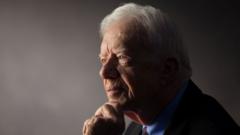Throughout the years since Jimmy Carter left the presidency, the landscape of American politics has evolved, yet many of the struggles facing the nation today echo those from his administration in the late 1970s. Drawing a comparative analysis between Carter and the current presidency of Joe Biden reveals striking similarities in economic, foreign policy, and domestic challenges.
During Carter's tenure, the U.S. grappled with significant economic discontent, exemplified by high inflation, alongside an international landscape challenge marked by the Iranian hostage crisis. Americans felt a profound sense of disillusionment regarding the government's ability to manage both domestic issues and global affiliations. This perceived failure resulted in significant political consequences, contributing to Carter’s defeat by Ronald Reagan in 1980, shortly after the release of Iranian hostages.
Fast-forwarding to 2024 under Biden's leadership, the country again faces inflation and a turbulent political climate, exacerbated by the ongoing impacts of the COVID-19 pandemic and geopolitical strife, such as the conflict in Ukraine. Biden’s leadership has similarly been scrutinized in light of the chaotic withdrawal from Afghanistan, a decision that mirrored Carter's struggles during the Iranian crisis. Both presidencies underscore the limits of U.S. influence in volatile regions, exacerbating public frustration regarding national capabilities.
Carter's diplomatic achievements, notably the Camp David Accords that aimed to stabilize the Middle East, sit alongside Biden's attempts to manage similarly intricate dynamics, including the war in Gaza and the aggression emanating from Iran. While Biden's early successes in uniting NATO against Russia's actions in Ukraine provide a contrast to Carter's experiences, the prolonged nature of these conflicts tests the administration's resolve and invites skepticism about America's role on the global stage.
Moreover, both leaders confronted a climate of skepticism regarding government efficacy. Carter termed the phenomenon a "crisis of confidence" in 1979, addressing declining faith in governmental institutions that was reflective of the post-Watergate era. This sentiment has persisted, with Biden facing rampant distrust amplified by political polarization and social media, echoing the deep-rooted skepticism Carter encountered.
As Biden navigates his presidency, he is compelled to consider the precedent set by Carter, facing accusations of inadequacy and ineffective crisis management. The comparisons drawn are not merely political rhetoric; they reflect genuine concerns among citizens about leadership amid crisis, inviting ongoing scrutiny and debate over the efficacy of governmental action.
In summary, the challenges faced by Biden today evoke an almost cyclical historical pattern, where an enduring sense of political and economic instability brings forth discussions of presidential capabilities. The experiences of Jimmy Carter continue to resonate, providing significant points of contemplation as Biden navigates his own presidency amidst familiar strife.



















